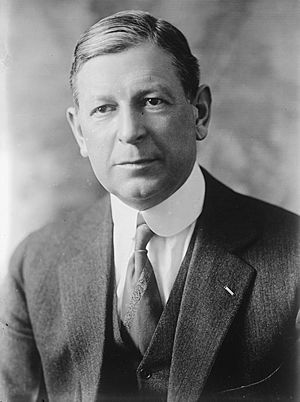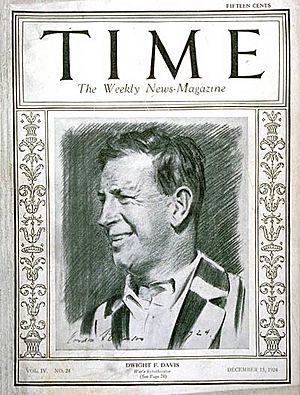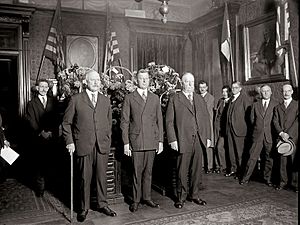Dwight F. Davis facts for kids
Quick facts for kids
Dwight F. Davis
|
|
|---|---|
 |
|
| Governor-General of the Philippines | |
| In office July 8, 1929 – January 9, 1932 |
|
| President | Herbert Hoover |
| Preceded by | Eugene Allen Gilmore |
| Succeeded by | George C. Butte |
| 49th United States Secretary of War | |
| In office October 14, 1925 – March 4, 1929 |
|
| President | Calvin Coolidge |
| Preceded by | John W. Weeks |
| Succeeded by | James Good |
| United States Assistant Secretary of War | |
| In office 1923–1925 |
|
| Appointed by | Calvin Coolidge |
| Preceded by | Mayhew Wainwright |
| Succeeded by | Hanford MacNider |
| Personal details | |
| Born |
Dwight Filley Davis
July 5, 1879 St. Louis, Missouri, U.S. |
| Died | November 28, 1945 (aged 66) Washington, D.C., U.S. |
| Political party | Republican |
| Education | Harvard University (BA) Washington University (LLB) |
|
Tennis career |
|
| Turned pro | 1895 (amateur tour) |
| Retired | 1902 |
| Plays | Left-handed (one-handed backhand) |
| Int. Tennis HoF | 1956 (member page) |
| Singles | |
| Highest ranking | No. 5 (1900) |
| Grand Slam singles results | |
| US Open | F (1898, 1899) |
| Other tournaments | |
| Olympic Games | 2R (1904) |
| Doubles | |
| Grand Slam doubles results | |
| Wimbledon | F (1901) |
| US Open | W (1899, 1900, 1901) |
| Other doubles tournaments | |
| Olympic Games | QF (1904) |
| Team competitions | |
| Davis Cup | W (1900, 1902) |
Dwight Filley Davis Sr. (born July 5, 1879 – died November 28, 1945) was an American tennis player and a politician. He is most famous for creating the Davis Cup, a major international tennis competition. He also served in important government roles, including Assistant Secretary of War from 1923 to 1925 and Secretary of War from 1925 to 1929.
Contents
Early Life and Tennis Career
Dwight Filley Davis was born in St. Louis, Missouri, on July 5, 1879. His grandfather, Oliver Dwight Filley, was the mayor of St. Louis from 1858 to 1861.
Dwight Davis was a very talented tennis player. He reached the finals of the Men's Singles at the US Championships in 1898 and 1899. He then teamed up with Holcombe Ward to win the Men's Doubles title at the championships three years in a row, from 1899 to 1901. Davis and Ward also made it to the Men's Doubles finals at Wimbledon in 1901.
In 1900, Davis came up with the idea for a new international tennis competition. He even donated a silver bowl for the winner. This competition was first called the International Lawn Tennis Challenge. Later, it was renamed the Davis Cup in his honor. He was part of the US team that won the first two competitions in 1900 and 1902. He was also the captain of the 1900 team.
He competed in the 1904 Summer Olympics. He was eliminated in the second round of the singles tournament. In the doubles tournament, he and his partner Ralph McKittrick lost in the quarter-finals.
In 1956, Dwight Davis was honored for his contributions to tennis. He was inducted into the National Tennis Hall of Fame, which is now known as the International Tennis Hall of Fame.
Public Service and Political Roles

Dwight Davis studied at Washington University Law School. Even though he never worked as a lawyer, he was very active in politics in his hometown of St. Louis. From 1911 to 1915, he served as the city's public parks commissioner. During this time, he improved sports facilities and created the first public tennis courts in the United States.
He served under President Calvin Coolidge as Assistant Secretary of War from 1923 to 1925. Then, he became the Secretary of War from 1925 to 1929. After that, he served as Governor General of the Philippines from 1929 to 1932 under President Herbert Hoover.
Military Service
Dwight Davis also had a notable military career. In 1915, he trained at the Preparedness Movement Citizens' Military Training Camp. From 1916 to 1917, he traveled through Europe as part of the Rockefeller War Relief Board.
When World War I began, Davis joined the Missouri National Guard as a private. He became an officer in August 1917. In France, he was promoted to Major and became an adjutant for the 69th Infantry Brigade. This brigade was part of the 35th Infantry Division. For his bravery, he received the Distinguished Service Cross. After the war, he continued to serve as a Colonel in the Army Reserves.
In 1942, during World War II, Davis was the first and only Director General of the Army Specialist Corps. This unit was short-lived. When it was disbanded, he became an advisor with the rank of Major General.
Personal Life and Death
Dwight Davis married his first wife, Helen Brooks, in 1905. She passed away in 1932. In 1936, he married Pauline Sabin. From 1933 until his death, he spent his winters in Florida at Meridian Plantation, near Tallahassee.
Dwight Davis died at his home in Washington, D.C. on November 28, 1945. He had been ill for six months. He was buried at Arlington National Cemetery.
Legacy
Dwight Davis's daughters also had interesting lives. His daughter Alice Brooks Davis married Sir Roger Makins, who was the British Ambassador to the United States. Another daughter, Cynthia Davis, married William McChesney Martin, Jr.. He was the longest-serving director of the Federal Reserve, from 1951 to 1970.
Dwight Davis was honored with a star on the St. Louis Walk of Fame for his achievements.
See also
 In Spanish: Dwight Davis para niños
In Spanish: Dwight Davis para niños


